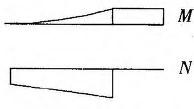网友您好, 请在下方输入框内输入要搜索的题目:
题目内容
(请给出正确答案)

A.
B.
C.
D.

B.

C.

D.

参考答案
参考解析
解析:图示单跨悬臂梁为静定结构。悬臂段弯矩应为定值,因此A、D被排除,剩下B、C,右支座弯矩应为连续,B被排除,选C。
更多 “A. B. C. D.” 相关考题
考题
Rumor is the most 1 way of spreading stories by passing them on from mouth 2 mouth. But civilized countries in normal times have better 3 of news than rumor. They have radio, television, and newspapers. In times of stress and 4 , 5 , rumor 6 and becomes widespread. At such 7 the different kinds of news are in 8 , the press, television, and radio versus the grapevine. Especially 9 rumors spread when war requires censorship(审查,检查)on many important matters. The customary news sources no longer 10 enough information. Since the people cannot learn 11 legitimate(合法的,正规的)channels all 12 they are anxious to learn, they pick up "news" 13 they can and when this 14 , rumor thrives.Rumors are often repeated 15 by those who do not believe the tales. There is a fascination about them. The reason is 16 the cleverly designed rumor gives expression to something deep in the hearts of the victims--the fears, suspicions, forbidden hopes, or daydreams which they hesitate to 17 directly. Pessimistic(悲观的)rumors about defeat and disasters show that the people who repeat them are 18 and anxious. 19 rumors about record production or peace soon coming point to complacency(满足,自得)or confidence and often to 20 .1. A. primitive B. important C. impossible D. outstanding2. A. till B. to C. for D. by3. A. means B. ways C. sources D. resource4. A. confusion B. peace C. prosperity D. worried5. A. and B. however C. so D. therefore6. A. emerges B. immerge C. immerse D. immense7. A. time B. the times C. times D. the time8. A. compete B. competition C. common D. harmony9. A. do B. did C. are D. were10. A. give up B. give off C. give out D. send off11. A. through B. by C. in D. across12. A. what B. why C. which D. that13. A. wherever B. where C. whatever D. what14. A. happened B. would happen C. happens D. happen15. A. ever B. even C. forever D. much16. A. that B. what C. why D. how17. A. act B. voice C. behave D. do18. A. happy B. relieved C. crazy D. worried19. A. Bad B. Pessimistic C. Optimistic D. Good20. A. overconfidence B. overweight C. overconsiderate D. overproduce
考题
莨菪碱(A)、山莨菪碱(B)、东莨菪碱(C)的碱性顺序为A. A. >B. >C.
B. A. >C. >B.
C. B. >A. >C.
D. B. >C. >A.
E. C. >B. >A.
考题
问答题Passage 1 Many visitors (1)______ Britain are not fond of English food. They are often heard (2)______ ,"English food is not good, English cooking is (3)______" But they do not really know what they are talking about because they (4)______ get a chance to eat it. (5)______ of the restaurants in large towns have foreign (6)______ and serve foreign food. When visitors are (7)______ to eat in an English home, the hosts often feel they must offer them something (8)______. Those of us (9)______ do know English food understand that at its best it (10)______ be really very good. (11)______, it is true to say that it is (12)______ terrible. Part of the (13)______ is that we are not really interested in food — we eat to live, we do not live to eat. So usually we do not (14)______ the necessary time cooking truly good meals. We like food that is simple and (15)______ to cook, or already prepared food which only needs heating up (16)______ eating. You can find the best English food in the country (17)______ the large towns, (18)______ life is slower and people are not in such a hurry. (19)______, of course, most visitors who come to London do not come because (20)______ food.1. A. in B. at C. to D. of2. A. saying B. asking C. telling D. talking3. A. wonderful B. nice C. terrible D. special4. A. always B. never C. seldom D. often5. A. Many B. Most C. All D. None6. A. visitors B. owners C. waiters D. guests7. A. invited B. made C. offered D. asked8. A. different B. usual C. foreign D. delicious9. A. whom B. who C. whose D. which10. A. should B. must C. may D. can11. A. At the same time B. On the other hand C. For example D. In another word12. A. some time B. sometime C. sometimes D. some times13. A. problem B. question C. answer D. time14. A. take B. waste C. spend D. have15. A. hard B. hardly C. easy D. easily16. A. when B. before C. after D. while17. A. near B. inside C. around D. away from18. A. when B. where C. which D. that19. A. But B. And C. So D. If20. A. on B. in C. of D. to
热门标签
最新试卷